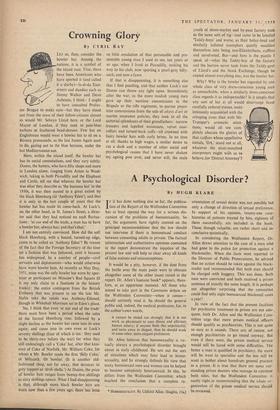A Psychological Disorder?
By HUGH KLARE
F it has done nothing else so far, the publica- I don of the Report of the Wolfenden Committee has at least opened the way for a serious dis• cussion of the problems of homosexuality. So far, the arguments have rightly centred on the principal recommendation that the law should not intervene if there is homosexual conduct between consenting adults in private. The factual information and authoritative opinions contained in the report demonstrate the injustice of the present law and will help to clear away all kinds of false notions and misconceptions.
It would be a pity, however, if the dust from the battle over the main point were to obscure altogether some of the other issues raised in the report. Dr. Allen's humane book* appears, there- fore, at an opportune moment. All those who intend to take part in the Commons debate on the Wolfenden Committee—when it comes— should certainly read it. So should the general public and, indeed, the medical profession, for, in the author's own words, it cannot be stated too strongly that it is our work as physicians to cure illness and alleviate human misery; if anyone finds this unpalatable, and turns away in disgust, then he should work in some other, more elegant profession.
Dr. Allen believes that homosexuality is vir- tually always a psychological disorder brought about in early childhood: He sets out the sort of situations which may later lead 'to homo- sexuality, and he strongly defends his view that many homosexual men and women can be helped to become completely heterosexual. In this, he differs from the Wolfenden Committee; which reached the conclusion that a complete re- * HOMOSEXUAL' I Y. By Clifford Allen. (Staples, 15s.) orientation of sexual desire was not possible but only a change of direction of sexual preference. In support of his opinion, twenty-one case- histories of patients treated by him, eighteen of them , successfully, are included in the book. These, though valuable, are rather short and in.- conclusive statistically.
In considering the Wolfenden Report, Dr. Allen draws attention to the case of a man who had gone to the police for protection against a blackmailer. When the facts were reported to the Director of Public Prosecutions, he advised that no action should be taken against the black- mailer and recommended that both men should be charged with buggery. This was done. Both men were convicted and both received a prison sentence of exactly the same length. It is perhaps not altogether surprising that the committee could find only eight homosexual blackmail cases a year !
In view of the fact that the present facilities for psychiatric treatment in prison are not ade- quate, both Dr. Allen and the Wolfenden COrn- mittee urge that more prison medical officers should qualify as psychiatrists. This is not quite so easy as it sounds. There are, of course, not enough psychiatrists to go round anyway. But even if there were, the prison medical service would still be faced with some difficulties. The better a man is qualified in psychiatry, the more will he want to specialise and the less will he want to bother about humdrum general practice in a prison. It is true that there are some out- standing prison doctors who manage to combine both sides, but the Wolfenden Committee is surely right In recommending that the whole or- ganisation of the prison medical service should be reviewed.






































 Previous page
Previous page